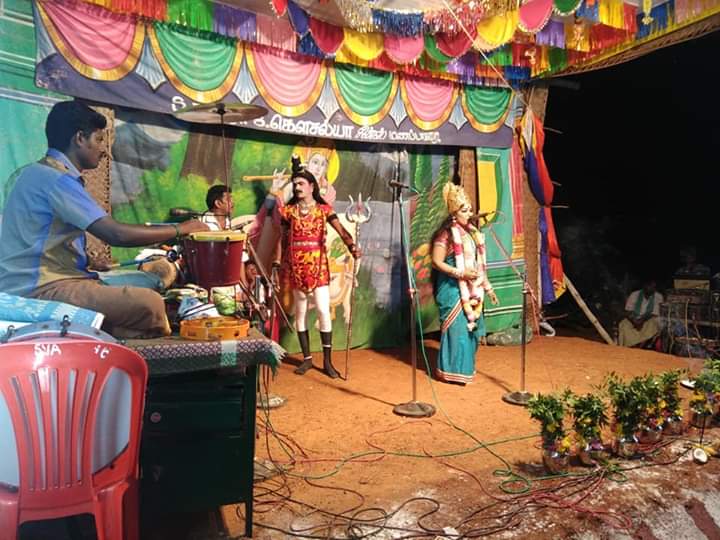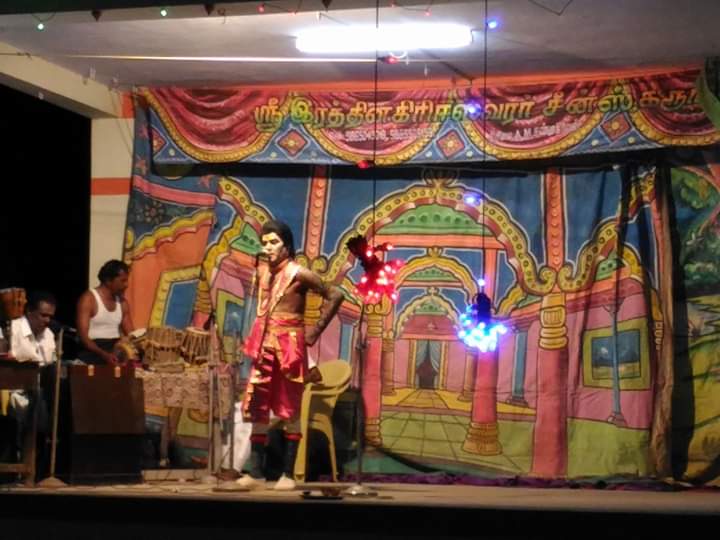
Stage artistes in TN in trouble as police read the EC ‘act’ wrong

As the larger electoral drama, with its many twists and turns, plays out on the political theatre, life is less colourful to the thousands of professional theatre artistes across Tamil Nadu.
Unlike their political counterparts, the artistes play out their predetermined parts from ramshackle stages set up as part of temple festivals in the peak months of April, May, and June. Their ornate make-up, headgear, and costumes belie their real woes. Now, its double whammy as the police are cracking down on them big time as the law-enforcers have misinterpreted an order of the Election Commission.
Their trouble began ahead of the 2016 Assembly elections. The EC tried to impose a blanket ban on plays as the commission thought political parties were using the medium for campaigns. But, fortunately, the then Chief Electoral Officer, Rajesh Lakhoni, sought the support of the South Indian Actors Association for election awareness programmes. The Federation of Tamil Nadu Music and Drama Artists Associations then met the CEO and told them that the dramas without politics should be allowed as it was a livelihood issue. “The request was accepted and the ban is only on political plays,” said Pazha Gandhi, general secretary of the federation.
“The plays we stage are culled out of history and mythology. These are not related to elections or politics in anyway. But still we are bearing the brunt,” says Annadurai, secretary, Karur Drama Artists Association. The Tamil months of Panguni, Chithirai, and Vaigasi (April, May and June) are the most auspicious and many temple festivals are conducted during these months, he said. “These three months are the season for us. We get a lot of bookings from the villages. We earn well during these months. But this elections, we are in trouble,” he said.

Artistes say they usually do 150 to 200 stages in the three months. For each programme, they get a minimum of ₹20,000. Each artiste gets ₹1,000 to ₹1,500 per programme. Women artistes are paid more than the men as their numbers are low and demand is high. “Already, the patronage for dramas is low. If the programmes are on weekends, we would get a larger crowd of viewers,” says Muthusamy, a Karur-based full-time drama artiste. He had been an actor for 50 years. He is the second generation artiste in a family and now his son follows suit.
Earlier, artistes used to perform three to four plays in a day. Now, it is usually one, he said. “In our association, we have 350 members. Out this, 150 are women. Our families depend on us and we depend on the villagers who book us for temple festivals. If the police restrict our performances, it is a subsistence issue,” he said. Besides Karur, artistes are widely spread in districts like Madurai, Sivagangai, Trichy, Salem, Pudukkottai and Chennai. Each district has its drama artistes’ association. Currently, the state had around 15,000 artistes.
Pazha Gandhi told The Federal it was sad that the police were not comprehending the EC order properly. “This time, the EC initially said plays could be staged till 10 pm. But, generally, a play starts by 10 pm and ends by 6 am. We met the CEO and he issued a fresh order stating that there are no restrictions on the conduct of dramas as part of temple events,” Gandhi added.
But most police officers think it is a blanket ban. The ban is only on political content, Gandhi said. “In many places, police officers blindly disallow performance. Due to this, the booked programmes too get cancelled, seriously affecting our livelihood,” he said.
Artistes perceive it an irony that they face such an issue in Tamil Nadu where personalities like MR Radha took Dravidian ideology to the masses through the medium of theatre.


